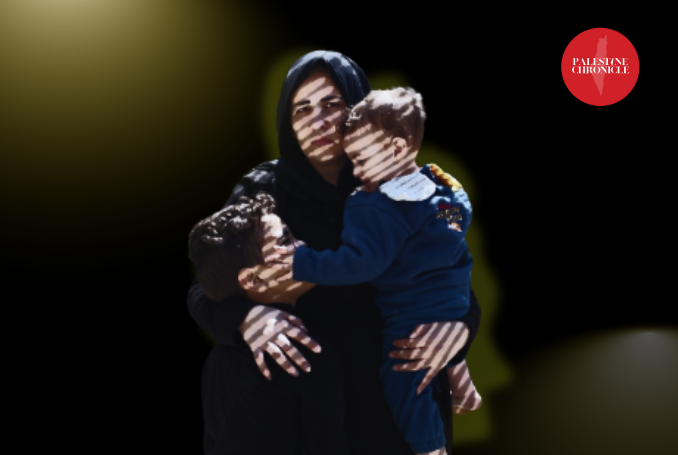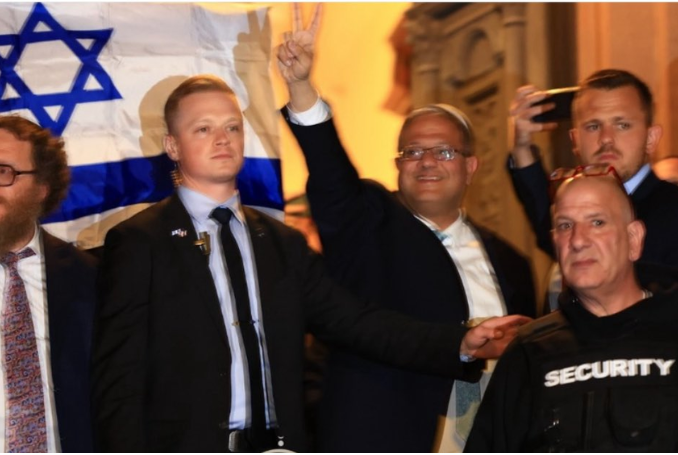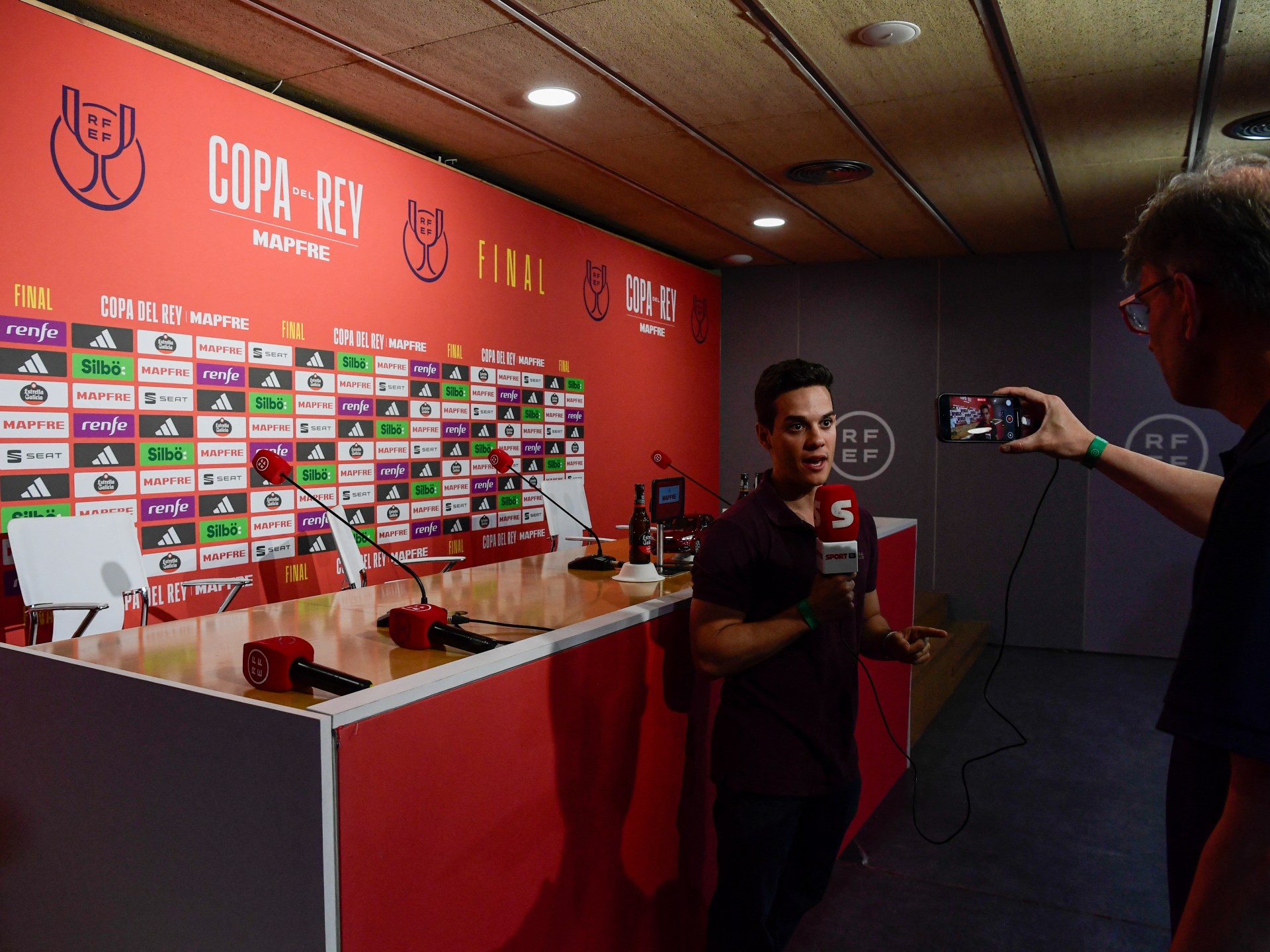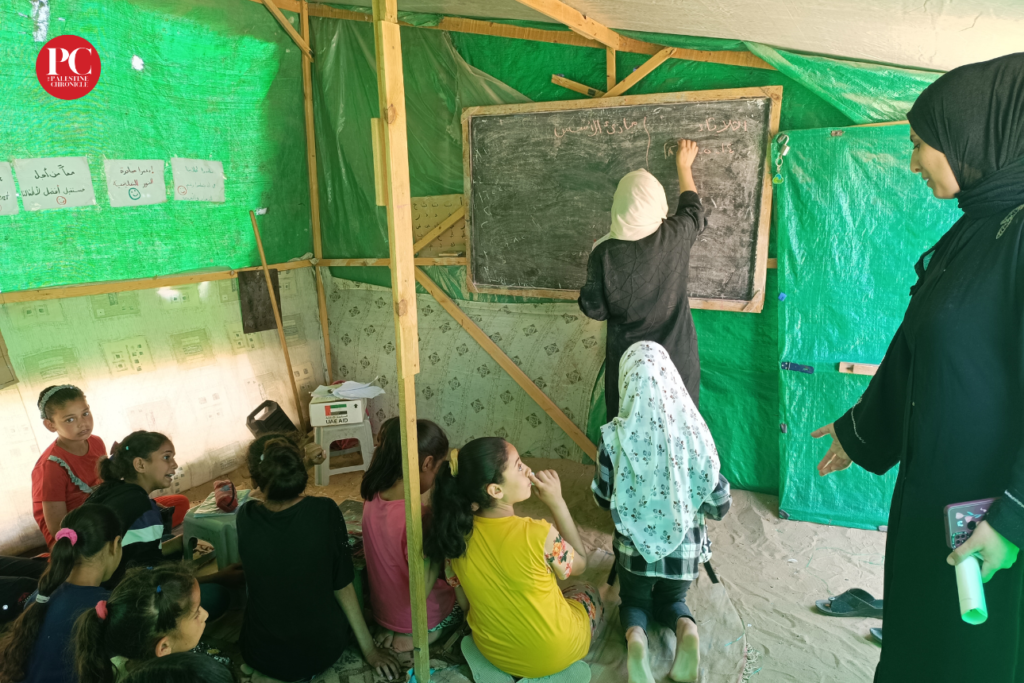
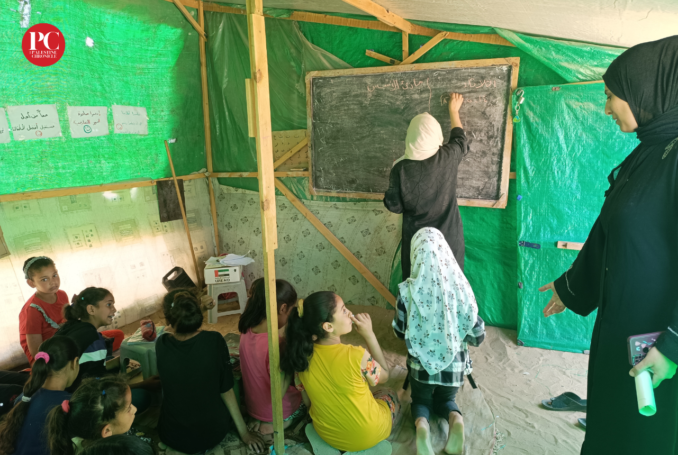
Written by Gaza-based Noor Alyacoubi, this article sheds light on how Gaza’s youth are resisting the devastation of war through education.
An entire generation in Gaza has been robbed of its right to a proper education by the genocidal war that Israel has waged against the civilian population for nearly 17 consecutive months.
Relentless bombings and targeted attacks have led to the total or partial destruction of nearly 500 educational institutions across the Gaza Strip. Schools and universities—once safe havens of learning—now lie in ruins, leaving students with nowhere to study and no normal to return to.
In this harrowing reality, e-learning has become the only available path for those determined to pursue their education. But even this fragile lifeline comes with nearly insurmountable challenges—chief among them: displacement, instability, and the lack of reliable internet access.
Sabreen, a 22-year-old English Literature student at Al-Azhar University, has managed to complete two semesters online during the war—an experience she describes as “the worst ever.”
This semester alone, Sabreen and her family—her mother, five sisters, and two brothers—were displaced multiple times.
“We moved from Khan Yunis to Rafah, and then to Al-Nuseirat,” she recounts. “As a student, the most difficult part was finding a stable internet connection.”
To keep up with her coursework, Sabreen walked long distances every few days, desperately searching for a signal strong enough to download her lectures.
“I used to save the videos to watch them later when I returned to our shelter,” she said.
One moment remains especially vivid in her memory:
“I remember sitting in the street until 8 PM, under the roar of Israeli warplanes, just to take an exam. I had no choice.”
When she had back-to-back exams, Sabreen would leave her family behind and head to her aunt’s shelter in Deir al-Balah in hopes of finding a slightly more stable connection.
“It was a bit easier to apply for my exams there,” she said.
For Sabreen, education has never been just about grades or degrees, it’s always been a passion.
“Unlike many students, I loved going to university. I loved attending classes and never missed a lecture,” she said with a nostalgic smile.
‘Our Future is Stolen by the War’ – Two Gaza Students Speak to the Palestine Chronicle
That’s why adapting to e-learning was especially difficult.
“At the beginning, I refused to register for online classes,” she admitted. “I kept telling myself: I’ll wait until life returns to normal. Then I’ll go back and receive real education.”
But the war dragged on. The bombings didn’t stop. Campuses remained closed. And reality struck.
“After much pressure from my mother and older sister, who warned me that universities might stay closed for years, I finally agreed to register and continue my studies.”
Despite the heroic efforts of both lecturers and students, meaningful learning remains a distant dream. Internet access is scarce, lectures are incomplete or delayed, and professors, many of whom are also displaced or grieving, struggle to teach under such impossible conditions.
“Students and teachers are enduring the same genocide. We’re all in this together, just trying to hold on.”
This year was supposed to mark Sabreen’s graduation. She dreamed of celebrating in the blooming courtyard of Al-Azhar University, wearing her traditional graduation thobe, surrounded by friends, posing for pictures, dancing with joy.
But reality was crueler.
In November 2023, Al-Azhar University—located in the heart of Gaza—was completely destroyed.
Graduation thobes are torn. Photos are faded. Friends are dead, injured, or missing. And Sabreen now sits in a shelter, not knowing whether the world will ever allow her to dream again.
She is one of thousands—bright minds buried under rubble, their futures paused indefinitely by war.
My Right to Joy: The 7-Year-Old Determined to Celebrate Eid in Gaza
Children’s Lost Childhood
In violation of all international and humanitarian laws, the children of Gaza are enduring the harshest, most brutal childhoods imaginable—forced to carry burdens far heavier than they were ever meant to bear.
Gone are the days when families compared their children’s achievements by asking:
“Who got the highest marks?”
“Who was top of the class?”
“Who brought us pride?”
Now, the only questions that matter are:
“Who can bring water?”
“Who can collect firewood?”
“Who can light a fire to cook?”
Since October 2023, schools have either been reduced to rubble or repurposed as overcrowded shelters for the displaced. Children have been forced to swap their backpacks for survival.
Instead of learning, playing, and dreaming, their daily priorities now revolve around finding food, water, and safety.
Permission to Live: What Happens Now as Israel Resumes Its War on Gaza?
“I feel heartbroken for my daughter, Zaina, for the tasks that were imposed on her because of the war,” her mother said.
When the war began, Zaina was almost six years old, just starting her educational journey.
“She was so excited to go to school. She felt like she had grown up,” her mother recalled. “But her joy didn’t last long.”
Now, Zaina is eight. She has yet to experience a real school day. Her dreams of education have been swallowed by war and displacement.
“She’s become used to a reality where there are no schools, no teachers, and no structure,” her mother said. “It has affected her readiness to learn.”
Her new routines reflect this grim normalization. When asked to do schoolwork or join an online class, she refuses. But when asked to fetch water, she eagerly agrees.
“She takes it as a chance to go outside and see her friends,” her mother said. “Children have lost their sense of commitment. Their lives are chaos, and they’ve adapted to it.”
Though she mourns the lost promise of her daughter’s early years, Zaina’s mother still considers her lucky.
“She hasn’t had to stand in long lines to bake bread or battle crowds to fill water. Her father handles that, while others don’t have fathers,” she said.
The war has not just destroyed buildings. It has shattered minds, futures, and a generation’s right to learn, grow, and dream. Whether it’s university students like Sabreen or young girls like Zaina, the children and youth of Gaza are being stripped of the most basic rights that define a childhood and a future.
What remains is a terrifying silence—of dreams deferred, voices muted, and futures held hostage.
But even in the rubble, a flicker of resistance persists.
The desire to learn.
To grow.
(The Palestine Chronicle)

– Noor Alyacoubi is a Gaza-based writer. She studied English language and literature at al-Azhar university in Gaza City. She is part of the Gaza-based writers’ collective We Are Not Numbers. She contributed this article to The Palestine Chronicle.


